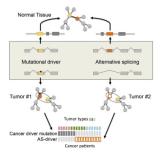
21/09/2017
Alternative splicing, an important mechanism for understanding cancer
Using data for more than 4,000 cancer patients from The Cancer Genome Atlas (TCGA project), a team led by Eduardo Eyras, ICREA research professor at the UPF and head of the Computational RNA Biology group of GRIB (IMIM-UPF) jointly with the Sanford Burnham Prebys Medical Discovery Institute in San Diego has analyzed the changes in alternative splicing that occur in each tumor patient and studied how these changes could impact the function of genes. The results of the study, published in the journal Cell Reports, show that alternative splicing changes lead to a general loss of functional protein domains, and particularly those domains related to functions that are also affected by genetic mutations in cancer patients.
"Thanks to our previous research, we know that tumor type and stage can be predicted by observing alterations in alternative splicing", says E.Eyras, and adds, "with this new study, we have discovered that changes in alternative splicing that occur in cancer impact protein functions in a way that is similar to that previously described for genetic mutations".
Reference work: Climente-González, Héctor, Eduard Porta-Pardo, Adam Godzik, Eduardo Eyras. "The Functional Impact of Alternative Splicing in Cancer". Cell Reports, 2017; 20 (9): 2215-2226.

13/09/2017
40 Million EUR european project for new drug safety assessment and integrative data analysis research
The five-year project eTRANSAFE: Enhancing Translational Safety Assessment through Integrative Knowledge Management, aims to develop an advanced data integration infrastructure together with innovative computational methods to improve the security in drug development process and is funded by the Innovative Medicines Initiative (IMI 2) together with the pharmaceutical industry.
The eTRANSAFE consortium is a private and public partnership of 8 academic institutions, 6 SMEs and 12 pharmaceutical companies, and is coordinated by the Fundació Institut Mar d'Investigacions Mèdiques (IMIM) and led by the pharmaceutical company Novartis. Universitat Pompeu Fabra and Synapse Research Management Partners are partners of the Consortium.
Based on the experience gained in the previous eTOX project, the eTRANSAFE project will carry out key efforts in the field of data standardisation and quality control, promoting the development and implementation of relevant data sharing policies and procedures that will have a great global impact in the community. eTRANSAFE will catalyse the transformation of drug safety modelling from monolithic applications and isolated data repositories to an open innovation ecosystem based on open standards, modular components and data integration services.
Professor Ferran Sanz, coordinator of the project said: "eTRANSAFE will improve translational safety assessment and contribute to the key scientific policies, such as the reduce, replace, refine (3Rs) one and the FAIR principles for data sharing."

19/07/2017
El GRIB participa en el Whitepaper sobre análisis de la estrategia Big Data en España
La publicación describe el panorama español del Big Data analizando el estado actual de la investigación, las infraestructuras y las tecnologías existentes en España para identificar los puntos fuertes y los espacios de mejora. El documento recoge el trabajo de recopilación realizado hasta la fecha y el análisis posterior, de cara a identificar proyectos prioritarios y potenciar y difundir el valor existente. Miguel Ángel Mayer, investigador postdoctoral del Grupo de Informatica Biomédica Integrada del GRIB (IMIM-UPF) es uno de los autores de este whitepaper.
La publicación se ha realizado en el marco de la iniciativa nacional multisectorial "Big Data", que surge para dar respuesta a una creciente demanda y expectativas en este dominio. Ha sido promovida por Planetic, la Plataforma Tecnológica Española de las Tecnologias de la Información y la Comunicación.
Dentro del marco Europeo que promueve la creación de un mercado único de datos, se trata en definitiva, de posicionar a España al mismo nivel de la iniciativa europea, descubriendo y dando soluciones a las oportunidades de negocio existentes en torno al Big Data.

19/07/2017
MedBioinformatics project celebrates the 8th General Assembly Meeting
The eighth General Assembly meeting of the MedBioinformatics project took place in Hinxton (UK) on June 14th 2017 at the Wellcome Genome Campus. This one-day meeting was focused on presenting updates from research activities of all project partners and to define a workplan to accomplish the goals of the project, with special attention to the various use cases being developed in collaboration with clinicians and translational researchers.
The project coordinator made announcement of the 3rd European Conference on Translational Bioinformatics (ECTB2018) which is planned for April 16-17th 2018, organized by the GRIB (IMIM-UPF) at the Barcelona Biomedical Research Park (PRBB), Barcelona.
The project MedBioinformatics "Creating medically-driven integrative bioinformatics applications focused on oncology, CNS disorders and their comorbidities" aims to develop useful bioinformatics tools and applications, and autonomously usable for analysing the huge amount of data and knowledge generated in healthcare and biomedical research in order to facilitate translational research and precision medicine. European project funded by H2020 for the period 2015-2018 and coordinated by the GRIB.

Supporting public-private partnerships in genomics and health
Over 80 participants from industry and academia gathered in Barcelona on 6-7 June for the ELIXIR Innovation and SME forum. Hosted by ELIXIR Spain, the two-day event showcased successful companies making use of public bioinformatics resources, and presented free bioinformatics resources available through ELIXIR and ELIXIR Spain.
The programme included presentations of ELIXIR and ELIXIR Spain resources as well as companies and SMEs active in bioinformatics, genomics and health research. Three keynotes each presented different aspects of working with open data in life science research: Roderic Guigo from the CRG gave a general overview of the Open data in genomics including the European Genome-phenome Archive; Ferran Sanz, director of GRIB (IMIM- UPF) and participant of ELIXIR Spain, showed several examples of how bioinformatics can support pharmaceutical research; and David Henderson from Bayer AG talked about reuse of biomedical data in pharmaceutical research. Colm Carroll from the Innovative Medicines Initiative (IMI) presented some of the future funding opportunities in this area
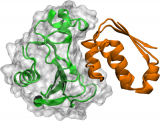
08/06/2017
Scientists reveal for the first time the details of protein association at the atomic level
The groups of Frank Noé at Freie Universität Berlin, and Gianni de Fabritiis, ICREA research professor and head of the Computational Biophysics group of GRIB ( IMIM- UPF), have now collaborated to produce what is the first atomic-detail computer simulation of the process of protein-protein association and dissociation. The results were published in the scientific journal Nature Chemistry and were validated with experimental data.
The main challenge was that atomic-detail molecular dynamics are incredible expensive to simulate. Key to the success of the Berlin-Barcelona team was the combination of several new technologies that enabled a "divide and conquer" approach to the problem. GPUGRID, a distributed network developed by De Fabritiis' group was employed to collect compute time on graphic processing units (GPUs) from Nvidia by volunteers around the globe. Thousands of short simulations were conducted that way, coordinated by a novel machine learning algorithm in such way that the overall protein association process could be simulated within one year instead of having to wait 10,000 years. Markov modeling, a method pioneered by Noé and colleagues, was used to combine the many short simulations to an overall dynamical model that describes protein association and dissociation in full detail. "This was clearly a risky but important proof of principle and we are happy that we managed to show that the simulations are able to capture associations between proteins", says De Fabritiis.
This achievement opens the door to understanding the details of viral infections, the inner workings of the immune system, and many other problems with biomedical or biotechnological relevance.
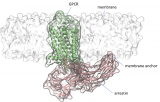
02/05/2017
How proteins find each other to form signaling complexes
A study led by Jana Selent, head of the GPCR drug discovery group of GRIB (IMIM-UPF) and Martha Sommer (Institute of Medical Physics and Biophysics at the Faculty of Medicine in Charité Hospital, Berlin) published in the journal Nature Communications, focused on how G-protein-coupled receptors (GPCRs) and arrestin form complexes. The human GPCR family is an important class of targets for nearly half of all medicines prescribed today with the majority being involved in sensory and neuronal processes. Complex formation with intracellular signaling proteins such as arrestin is critical for many bodily processes. In this context, the published study identifies a previously unknown binding element critical to GPCR-arrestin interaction. Using a combination of computer simulations and site-directed fluorescence spectroscopy, the researchers were able to show that loops within the C-edge of arrestin are anchored to the membrane while forming pre- and high affinity complexes with GPCRs. This discovery opens up a whole new field of research regarding how the membrane influences formation of GPCR signaling complexes with arrestin. Ultimately, these insights can be exploited for proposing new strategies to modulate this important class of drug targets.
Pub Reference: Ciara C.M. Lally, Brian Bauer, Jana Selent & Martha E. Sommer. C-edge loops of arrestin function as a membrane anchor. Nature Communications, 2017. doi: 10.1038/ncomms14258.
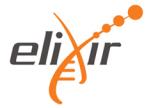
From Tue 6 June 2017, 13:30 to Wed 7 June 2017, 14:00
ELIXIR Innovation and SME Forum next 6th & 7th of June 2017 at PRBB. Don't miss it!
Public-private partnerships in open data.
Registration ends in an hour!!!!
Come to the ELIXIR Innovation and SME forum which aim is to showcase to companies the free data resources and services that are available through ELIXIR Spain and ELIXIR Europe more generally. It will feature talks from ELIXIR partners on some of the key databases and resources and present examples of innovative companies that are already using public data in their businesses.
The event is free and open to all companies large and small, in the Barcelona region and further afield. It is organised by ELIXIR Spain and the ELIXIR Hub in collaboration with Innovative Medicines Initiative (IMI), biocat, BioInformatics Barcelona (BIB) and Barcelona Biomedical Research Park (PRBB) and is particularly relevant for large and small companies active in the genomics and health domains.
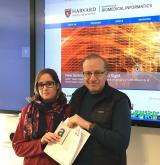
08/03/2017
Alba Gutiérrez-Sacristán, winner of the first prize at the Datathon on Autism SSC data
Congratulations to Alba Gutiérrez-Sacristán for the first prize won at the Datathon on Autism SSC data celebrated during the last month of February at the Department of Biomedical Informatics (DBMI), Harvard Medical School (USA). Alba is a predoctoral researcher at the Integrative Bioinformatics group of GRIB (IMIM-UPF) and she is doing a six months stage at DBMI of Harvard Medical School, working on analyzing Autism data sets, integrating genetic and clinical data to model disease expression using the R statistical tool connected to a i2b2/tranSMART database.
The Datathon on Autism SSC data was addressed to all labs at DBMI or working on PI-SURE. Participants were required to create in a month the coolest use case on Autism Simons Simplex Data combining clinical and Exome variant data using the BD2K PIC-SURE API and jupyter notebooks.
Alba created an R package in order to help researchers to analyse both clinical and molecular data included in the Simons Simple Collection, a permanent repository of genetic samples from 2,600 simplex families, each of which has one child affected with an autism spectrum disorder, and unaffected parents and siblings, winning the first price!
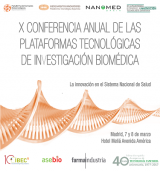
30/03/2017
Celebrada la X Conferencia Anual de Plataformas Tecnológicas de Investigación Biomédica
La Conferencia se celebró en Madrid los días 7 y 8 de marzo y contó con la asistencia de casi 300 personas entre investigadores, autoridades y representantes de las administraciones y de compañías farmacéuticas, entre otros. Durante estos días, se abordaron cuestiones sobre investigación clínica, proyectos concretos de reutilización de datos para investigación biomédica, investigación en enfermedades raras, nuevas redes de investigación para la cooperación público-privada, innovación en centros públicos y colaboración con la industria biofarmacéutica. Todas las presentaciones y videos de esta Conferencia están disponibles en www.medicamentos-innovadores.org
Ferran Sanz, director del GRIB y copresidente, junto con Javier Urzay, subdirector general de Farmaindustria, de la Plataforma Tecnológica Española de Medicamentos Innovadores (PTEMI), presentó la sesión sobre "Análisis masivos de datos y reutilización de datos para la investigación biomédica".



